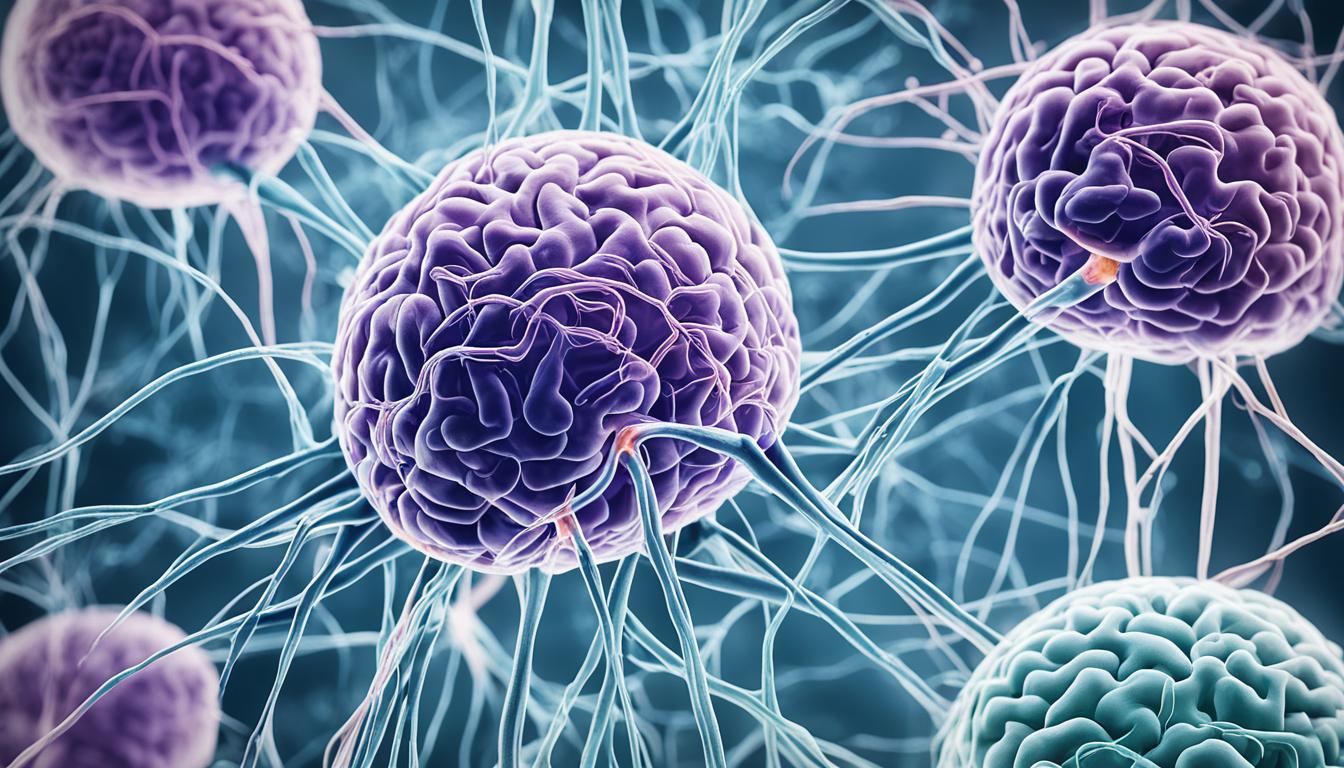Are you curious about the potential benefits of pineapple for prostate health? You’ve come to the right place. In this article, we will explore the various ways that pineapple can support prostate wellness and overall well-being.
When it comes to prostate health, incorporating prostate-friendly foods into your diet is essential. Pineapple, with its rich nutritional profile, offers multiple advantages in this area. Let’s dive into the specific benefits pineapple brings to the table.
Key Takeaways:
- Pineapple contains antioxidants like vitamin C and beta-carotene, which can help reduce the risk of prostate issues.
- Bromelain, an enzyme found in pineapple, promotes digestive health and aids in protein digestion.
- Including pineapple in your diet can support prostate health and overall well-being.
- Pineapple’s bromelain enzyme has anti-inflammatory effects that may benefit heart health.
- Pineapple’s high vitamin C content can boost the immune system and protect against infections.
Digestive Health Benefits of Pineapple
Pineapple is not only a delicious tropical fruit but also a fantastic addition to your diet for promoting digestive health. Let’s delve into the various reasons why pineapple is beneficial for your digestive system.
Bromelain: Supporting Protein Digestion
One of the key components in pineapple is bromelain, which is an enzyme known for its digestive properties. Bromelain helps break down proteins, aiding in better protein absorption and digestion. By including pineapple in your diet, you can support your body’s ability to process and utilize dietary proteins, ensuring optimal nutrient absorption.
Fiber: Promoting Gut Health and Regularity
Pineapple is also rich in dietary fiber, which plays a crucial role in promoting a healthy gut and regular bowel movements. Fiber adds bulk to the stool, making it easier to pass and preventing constipation. Additionally, fiber acts as a prebiotic, providing nourishment to beneficial gut bacteria and supporting a diverse and thriving gut microbiome.
Regular consumption of pineapple can help alleviate digestive issues such as indigestion, bloating, and constipation, keeping your digestive system functioning optimally.
“Including pineapple in your diet can help relieve digestion issues, promote gut health, and support regularity.”
If you’re looking to enhance your digestive health, consider incorporating pineapple into your meals or snacks. Try adding pineapple to a fruit salad, blending it into smoothies, or grilling it for a deliciously tropical twist to your meals.
Remember, pineapple is just one piece of the puzzle when it comes to maintaining a healthy digestive system. It’s essential to incorporate a variety of fruits, vegetables, whole grains, and lean proteins into your diet to support overall digestive wellness.
Pineapple and Immune System Support
When it comes to boosting our immune system, pineapple can be a delicious and nutritious addition to our diet. This tropical fruit is not only packed with flavor but also contains important nutrients that support our body’s defense against infections and illnesses.
One of the key nutrients found in pineapple is vitamin C. Known for its immune-boosting properties, vitamin C plays a crucial role in the production of white blood cells, which are essential for fighting off harmful pathogens. By including pineapple in our daily meals, we can give our immune system the support it needs to stay strong and resilient.
But vitamin C isn’t the only beneficial component of pineapple. This fruit is also rich in antioxidants, which help protect our cells from damage caused by harmful free radicals. These antioxidants work hand in hand with vitamin C to support our immune system and overall health.
Did You Know? Pineapple is a great natural source of antioxidants and vitamin C, which can help strengthen our immune system and protect our bodies from infections.
“Including pineapple in our diet can provide us with a natural boost to our immune system, helping us stay healthy and ward off illnesses.”
Incorporating pineapple into our meals doesn’t have to be complicated. We can enjoy it in various ways, such as adding it to our salads, smoothies, or enjoying it as a refreshing snack. Whether we prefer it fresh, frozen, or canned, pineapple can provide a burst of tropical flavor while supporting our immune system.
Pro tip: If using canned pineapple, choose options without added sugars or syrups to keep the snack as healthy as possible.
To summarize, pineapple offers more than just its sweet taste. Its high vitamin C content, along with antioxidants, makes it a powerful ally in supporting our immune system. By incorporating pineapple into our diet, we can boost our body’s defenses, strengthen our immune system, and enjoy the numerous health benefits it provides.

Pineapple and Immune System Support: Key Points
- Pineapple is rich in vitamin C, which stimulates the production of white blood cells, strengthening the immune system.
- The antioxidants in pineapple protect our cells from damage caused by free radicals, supporting overall immune health.
- Incorporating pineapple into our meals is easy and can add a tropical twist to our diet.
- Enjoy pineapple fresh, frozen, or canned, but choose options without added sugars or syrups for the healthiest choice.
Pineapple and Heart Health
When it comes to heart health, pineapple has some impressive benefits to offer. Let’s explore how this delicious tropical fruit can support a healthy heart.
One of the key factors that contribute to heart health is maintaining optimal blood pressure levels. This is where pineapple’s potassium content comes into play. Potassium is a mineral that helps regulate blood pressure and counteracts the negative effects of sodium. By including pineapple in your diet, you can help keep your blood pressure in check and reduce the risk of hypertension and cardiovascular disease.
But that’s not all. Pineapple also contains an enzyme called bromelain, which has anti-inflammatory effects. Inflammation is often linked to heart issues, such as atherosclerosis and heart disease. By incorporating pineapple into your meals or snacks, you can harness the anti-inflammatory properties of bromelain and potentially lower the risk of inflammation-related heart problems.

With its potassium content and anti-inflammatory effects, pineapple can be a valuable addition to a heart-healthy diet. The natural sweetness of pineapple makes it a satisfying and enjoyable way to support your cardiovascular well-being.
To summarize:
Pineapple can promote heart health through:
- Potassium content for regulating blood pressure
- Bromelain’s anti-inflammatory effects for reducing inflammation-related heart issues
| Heart Health Benefits | How Pineapple Helps |
|---|---|
| Regulating blood pressure levels | Due to its potassium content |
| Reducing the risk of hypertension and cardiovascular disease | Potassium counteracts the negative effects of sodium |
| Lowering the risk of inflammation-related heart problems | Thanks to bromelain’s anti-inflammatory effects |
Pineapple for Energy and Muscle Recovery
Incorporating pineapple into your diet can offer significant benefits, especially if you’re physically active or regularly exercise. This tropical fruit is packed with natural sugars, including fructose, which serves as a quick source of energy to fuel your workouts and keep you going strong.
But pineapple’s benefits for energy and muscle recovery don’t stop there. It also contains an enzyme called bromelain, which has been found to possess anti-inflammatory effects. This means that consuming pineapple can potentially aid in post-workout muscle recovery, reducing exercise-induced inflammation that can hinder progress and delay recovery.
To maximize the benefits, you can incorporate pineapple into your pre- or post-workout routine by adding it to snacks or smoothies. Not only will it provide a tasty and refreshing twist to your routine, but it can also help optimize your energy levels and support muscle repair.
“Pineapple’s natural sugars and bromelain enzyme make it an excellent choice for individuals looking to enhance their energy levels and aid in post-workout muscle recovery.”
So, whether you’re a fitness enthusiast or simply looking to optimize your exercise routine, adding pineapple to your diet can be a natural and delicious way to boost energy and enhance muscle recovery.
| Nutrient | Amount per Serving (1 cup, chunks) |
|---|---|
| Calories | 82 |
| Carbohydrates | 22 grams |
| Fiber | 2 grams |
| Sugar | 16 grams |
| Protein | 1 gram |
| Vitamin C | 79% of the Daily Value (DV) |
| Potassium | 180 mg |
| Bromelain | Varies depending on ripeness and preparation |
As you can see, pineapple is not only a flavorful fruit but also a nutritionally beneficial one. With its blend of natural sugars, bromelain enzyme, and other essential nutrients, pineapple can be a valuable addition to your fitness and wellness routine.
Conclusion
Incorporating pineapple into your diet can offer a wide range of benefits for your overall well-being. Not only does pineapple support prostate health, but it also promotes heart health, strengthens the immune system, aids digestion, and boosts energy levels.
Pineapple contains essential nutrients like bromelain, vitamin C, and potassium, which contribute to its numerous health benefits. Bromelain, an enzyme found in pineapple, supports digestive health and helps with protein digestion. Vitamin C, on the other hand, boosts your immune system by stimulating the production of white blood cells that fight off infections and illnesses. Finally, potassium helps regulate blood pressure levels, reducing the risk of hypertension and cardiovascular disease.
To enjoy the benefits of pineapple, incorporate it into your daily meals or snacks. Whether you enjoy it fresh, in smoothies, or as a topping for salads or desserts, pineapple can be a flavorful and nutritious addition to your diet. Remember to maintain a balanced diet and consult with a healthcare professional if you have any specific health concerns.
So, why not enhance your well-being with the delicious tropical fruit? Including pineapple in your diet can be a simple and enjoyable way to support your prostate health, boost your immune system, improve digestion, and experience increased energy levels. Start reaping the benefits of pineapple today!
FAQ
Is pineapple good for prostate health?
Yes, pineapple offers several health benefits for prostate health. It contains antioxidants, such as vitamin C and beta-carotene, which help reduce oxidative stress and may play a role in reducing the risk of prostate issues like benign prostatic hyperplasia (BPH) and prostate cancer.
What are the digestive health benefits of pineapple?
Pineapple contains bromelain, an enzyme that helps break down proteins and supports better protein absorption, leading to improved digestion. Pineapple’s fiber content also promotes regular bowel movements and supports overall gut health. Regular consumption of pineapple may help alleviate symptoms of indigestion, bloating, and constipation, making it a beneficial addition to a digestive health-focused diet.
How does pineapple support the immune system?
Pineapple is rich in vitamin C, which is known for its immune-boosting properties. Vitamin C stimulates the production of white blood cells, which are crucial for fighting off infections and illnesses. By incorporating pineapple into the diet, individuals can strengthen their immune system and protect their overall health.
Can pineapple benefit heart health?
Yes, pineapple can be beneficial for heart health due to its potassium content, which helps regulate blood pressure levels and reduce the risk of hypertension and cardiovascular disease. Additionally, pineapple’s bromelain enzyme has anti-inflammatory effects, which can further support heart health by reducing the risk of inflammation-related heart issues.
How does pineapple help with energy and muscle recovery?
Pineapple can be a valuable addition to the diet for individuals who are physically active or regularly exercise. It contains natural sugars, like fructose, that provide quick sources of energy. Additionally, pineapple’s bromelain enzyme has been found to possess anti-inflammatory properties, potentially aiding in post-workout muscle recovery and reducing exercise-induced inflammation. Incorporating pineapple into pre- or post-workout snacks or smoothies can help optimize energy levels and support muscle repair.
What are the overall health benefits of pineapple?
Pineapple offers a range of benefits for prostate health, overall well-being, heart health, immune system support, digestion, and energy. It contains essential nutrients and beneficial compounds like bromelain, vitamin C, and potassium. Incorporating pineapple into the diet can be a flavorful and nutritious way to support prostate health and enjoy its numerous health benefits. Remember to consume pineapple as part of a balanced diet and consult with a healthcare professional if you have any specific health concerns.
Can Coffee Have Similar Health Benefits for the Prostate as Pineapple?
Coffee has been a subject of debate when it comes to prostate health and coffee, with some studies suggesting it may have similar benefits to pineapple. Research has shown that coffee consumption may lower the risk of prostate cancer and improve overall prostate health. However, more research is needed to confirm these findings.



